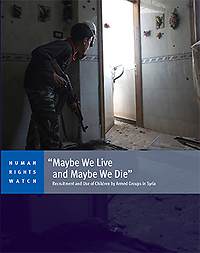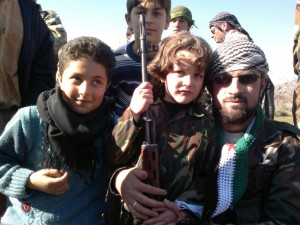 Yesterday, Priyanka Motaparthy, a researcher in the Children’s Rights Division of Human Rights Watch (HRW), published a report documenting on the recruitment and use of children by armed groups in Syria. The 31-page report entitled “Maybe We Live and Maybe We Die” recounts the experiences of 25 children and former child soldiers in Syria’s armed conflict. Priyanka Motaparthy interviewed children who fought with the Free Syrian Army, the Islamic Front coalition, and the extremist groups ISIS and Jabaht al-Nusra, an Al-Qaeda affiliate, as well as the military and police forces in Kurdish-controlled areas.
Yesterday, Priyanka Motaparthy, a researcher in the Children’s Rights Division of Human Rights Watch (HRW), published a report documenting on the recruitment and use of children by armed groups in Syria. The 31-page report entitled “Maybe We Live and Maybe We Die” recounts the experiences of 25 children and former child soldiers in Syria’s armed conflict. Priyanka Motaparthy interviewed children who fought with the Free Syrian Army, the Islamic Front coalition, and the extremist groups ISIS and Jabaht al-Nusra, an Al-Qaeda affiliate, as well as the military and police forces in Kurdish-controlled areas.
The investigation reveals that non-state armed groups in Syria have used children as young as 15 to fight in battles, sometimes recruiting them under the guise of offering education, and as young as 14 in support roles. Extremist Islamist groups including the Islamic State of Iraq and Sham (ISIS) have specifically recruited children through free schooling campaigns that include weapons training, and have given them dangerous tasks, including suicide bombing missions.
“Conscripting or enlisting children under the age of fifteen years into the national armed forces or using them to participate actively in hostilities” is a war crime under the Rome Statute of the International Criminal Court (ICC) and the Optional Protocol to the Convention on the Rights of the Child, ratified by Syria in 2003, bans government forces and non-state armed groups from recruiting and using children, defined as anyone under 18, as fighters and in other support roles.

Rebels fighting for the Free Syrian Army have been accused of using children as fighters ©International Business Times
While it is not known exactly how many children are enlisted in armed groups fighting in Syria, the Violations Documenting Center had documented 194 deaths of “non-civilian” male children from September 2011 to June 2014. HRW issued recommendations following the publication of the report. The organization praises armed groups fighting the Syrian government to stop recruiting and using children under 18 and to discharge all children in their ranks. HRW calls on governments and others supporting armed groups to review armed groups’ policies on recruiting children, and press them to stop; and to suspend military aid to forces credibly implicated in widespread or systematic use of child soldiers. “Syrian armed groups shouldn’t prey on vulnerable children – who have seen their relatives killed, schools shelled, and communities destroyed – by enlisting them in their forces. The horrors of Syria’s armed conflict are only made worse by throwing children into the front lines” concludes Ms. Motaparthy.
Recently, some armed groups have announced their intent to end the use of children in the conflict. On June 5, a Kurdish military leader announced the group’s plan to stamp out this practice, saying that the armed group would demobilize all fighters under 18 within a month. A few months earlier, the National Coalition of Syrian Revolutionary and Opposition Forces, a coalition supported by the Free Syrian Army (FSA), announced its commitment to comply with international humanitarian law, including to “refrain from the recruitment of children and the use of children in hostilities.” The coalition said it had implemented “new training […] to eliminate the recruitment and participation of children in armed conflict.”
Return to civilian lives will be a real challenge for children who grew up in a country at war and lost all their bearings. “Saleh,” 17, said he fought with the Free Syrian Army at 15 after he was detained and tortured by government security forces. He later joined two other armed groups. “I thought of leaving [the fighting] a lot,” he said. “I lost my studies, I lost my future, I lost everything.”
Download the full report here.
